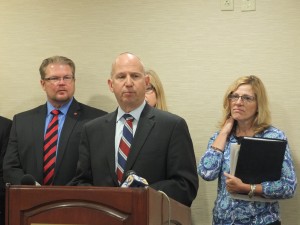(Smyrna, Delaware) – On December 13, 2019, the Delaware Emergency Management Agency (DEMA) officially earned accreditation by the Emergency Management Accreditation Program (EMAP). Only nine programs nationwide completed the rigorous assessment process in 2019 to achieve either initial accreditation or reaccreditation. This is the initial accreditation for DEMA and the State’s emergency management program.
“Congratulations to those programs that have maintained their accredited status as well as those who have joined the elite leaders in emergency management having earned accreditation through the Emergency Management Accreditation Program. Through their commitment and leadership, they have proven to their communities and stakeholders that their programs are sustainable and that they continue to focus on their communities’ best interests,” stated Nick Crossley, Director of the Hamilton County Emergency Management and Homeland Security Agency and the EMAP Commission Chair.
Providing emergency management programs the opportunity to be evaluated and recognized for compliance with standards certified by the American National Standard Institute (ANSI) and recognized by the industry complies with EMAP’s mission to build safer communities through credible standards of excellence. These programs demonstrate accountability and focus attention on areas and issues where resources are needed to heighten their preparedness efforts to address any technical or natural disaster that may affect their communities.
To achieve accreditation, applicants must demonstrate through self-assessment, documentation and peer assessment verification that its program meets the Emergency Management Standard set forth by EMAP. The emergency management program uses the accreditation to prove the capabilities of their disaster preparedness and response systems. Accreditation is valid for five years and the program must maintain compliance with the Emergency Management Standard and is reassessed to maintain accredited status.
Through standardization EMAP revolutionizes emergency management programs that coordinate preparedness and response activities for disasters. In addition to obtaining the ability to measure those capabilities, EMAP recognizes the ability of emergency management programs to bring together personnel, resources and communications from a variety of agencies and organizations in preparation for and in response to an emergency. The Emergency Management Standard is flexible in design so that programs of differing sizes, populations, risks and resources can use it as a blueprint for improvement and can attain compliance with those standards in an accreditation process. The accreditation process evaluates emergency management programs on compliance with requirements in sixteen areas, including: planning; resource management; training; exercises, evaluations, and corrective actions; communications and warning; and administration. EMAP is the only accreditation process for emergency management programs.
DEMA Director A.J. Schall said “The team at DEMA started on this journey in 2018. Over the last eighteen months we have worked diligently to review our processes, plans, and relationships. Over that time, we learned a tremendous amount and modernized procedures. This was a division-wide project and everyone on the team had an important part. I couldn’t be more proud for their dedication to the State.”
# # #
